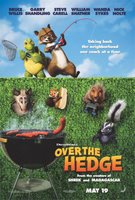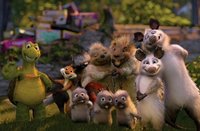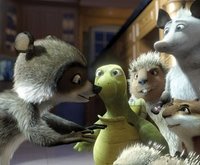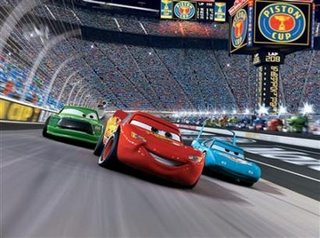 "I am speed!" So goes Lightning McQueen's pre-race mantra. Lightning is on the fast lane to success and he doesn't have time to slow down for anybody.
"I am speed!" So goes Lightning McQueen's pre-race mantra. Lightning is on the fast lane to success and he doesn't have time to slow down for anybody.However, Lightning doesn't have much of a choice when he lands in the sleepy burg of Radiator Springs. He is forced to repair the road he demolished and during his labor he learns to slow down long enough to make friends with the other cars.
I noted in my entry on Over The Hedge that inspiration comes from the strangest of places. Here is yet another "kids movie" delivering a high-octane message for our overindulgent culture. With Over the Hedge, the theme was excess and consumerism. With Cars, the lesson of the day is time and the breakneck speed of our society that causes us to become less caring and considerate. Both movies are a much needed commentary on how the powers of greed and speed are eroding community.
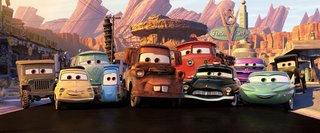 There's much to commend in this film. I am always impressed by the wizards of PIXAR. Every movie they've turned out has been a winner. Unlike Dreamworks, they always work from original concepts and they immerse themselves and their movies in the concepts. Be on the lookout for Click and Clack from NPR's Car Talk. There's a variety of famous race car drivers voicing characters. Cars is filled with lore about Route 66. (I am reading Grapes of Wrath and I find it interesting that both a Steinbeck novel of the Great Depression and a computer animated film about talking cars are both drawing from the significance of the Mother Road). Pay particular attention to the scene in which Sally tells Lightning how I-40 bypassed Radiator Springs to save 10 minutes of driving time. One cannot help but wonder what we have sacrificed for speed.
There's much to commend in this film. I am always impressed by the wizards of PIXAR. Every movie they've turned out has been a winner. Unlike Dreamworks, they always work from original concepts and they immerse themselves and their movies in the concepts. Be on the lookout for Click and Clack from NPR's Car Talk. There's a variety of famous race car drivers voicing characters. Cars is filled with lore about Route 66. (I am reading Grapes of Wrath and I find it interesting that both a Steinbeck novel of the Great Depression and a computer animated film about talking cars are both drawing from the significance of the Mother Road). Pay particular attention to the scene in which Sally tells Lightning how I-40 bypassed Radiator Springs to save 10 minutes of driving time. One cannot help but wonder what we have sacrificed for speed. By the way, don't rush out of the theatre when the story ends. You always want to stay until the very end of a PIXAR film and enjoy the outtakes and final scenes, but this time you should really just slow down and not be in too much of a hurry.
By the way, don't rush out of the theatre when the story ends. You always want to stay until the very end of a PIXAR film and enjoy the outtakes and final scenes, but this time you should really just slow down and not be in too much of a hurry.
